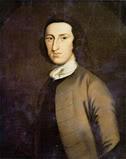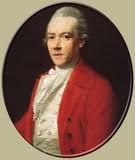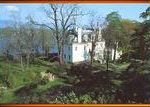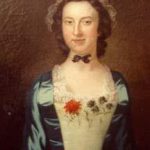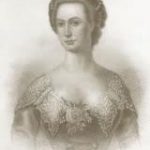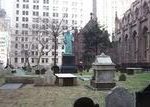Wife of Patriot: William Livingston
Image: William Livingston
Delegate to the Continental Congress
William Livingston was born in 1723 at Albany, NY, son of Philip and Catharine (Van Brugh) Livingston. His mother was the daughter of the Dutch mayor of Albany Pieter Van Brugh. His paternal grandfather, Robert Livingston, had emigrated to American in 1673, and received grants to Livingston Manor – a large tract of land on the Hudson River. William spent his childhood there under the indulgent care of his maternal grandmother Sarah Van Brugh.
At the age of fourteen, William lived for a year with a missionary among the Mohawk Indians in the wilds of New York’s Mohawk Valley, an experience which his family felt would be valuable if he later turned his attention to the fur trade or land speculation on the frontier.
In 1738, William went to Yale to follow the path of his three elder brothers, and graduated in the class of 1741, at the age of 18. While in college, he developed a strong interest in art, languages and poetry, and decided that law interested him more than entering the family fur business at Albany or mercantile pursuits.
William studied law under James Alexander and William Smith, both considered to be the best legal minds of that day. Both Alexander and Smith were champions of civil rights, and their influence on Livingston became clear as he matured. Alexander had been a vigorous champion of the freedom of the press in connection with the Zenger trial.
In 1745, William married Susannah French, the daughter of New Jersey landowner Philip French and the granddaughter of a lieutenant governor of New York. Simple and unpretending in manner, she was endowed with a strong intellect and a warm heart. The couple became a glittering fixture in the city’s social whirl, but William still found time to pursue his interest in art, languages, and poetry. The marriage would produce 13 children, a large family even for that time. “As many children as there are states in the Union,” he would boast.
In 1748, William was admitted to the bar and opened a law practice in New York City, where he became known as a strong supporter of civil rights, especially freedom of religion and freedom of the press. He gained a reputation as a supporter of popular causes against the more conservative factions in the city.
William also became known for his political essays, which were published in the Independent Reflector, a weekly newspaper that he founded in 1752. He first entered politics as a member of the New York Assembly, a position he held from 1759 to 1769. In 1769, Livingston’s supporters, split by the growing debate as to how to respond to British taxation of the colonies, lost control of the assembly.
In 1760, William had grown tired of legal practice and was planning to build a country home, he bought 120 acres in what was then sleepy Elizabethtown, New Jersey, just across the river from his New York home. For the next 12 years, Livingston developed the extensive grounds, and oversaw the building of a beautiful 14-room Georgian-style home, in which to house their growing family. Finally, in 1773, William and Susannah and their children moved to their new estate, Liberty Hall.
In 1774, the Livingston’s daughter Sarah married John Jay, in what was then qualified as a royal wedding. Jay was also a Dutch American who became prominent in the birth and development of the United States, serving as the first Chief Justice of the Supreme Court, and as the first Secretary of State under President George Washington. Sarah Livingston Jay became New York City’s foremost social hostess.
When New Jersey began organizing its defenses in late 1775, William joined the militia as brigadier general, the state’s ranking officer. But he insisted that the first regiments raised for Washington’s Continental Army be commanded by more experienced men, while he concentrated on the less glamorous tasks of raising, organizing, and training the state’s citizen-soldiers. These efforts contributed significantly to the later combat effectiveness of New Jersey’s units.
When a massive buildup of British ships and troops in New York harbor indicated that a major invasion was imminent, Congress called on the states to reinforce Washington’s outnumbered army. In 1776, William left Congress and took to the field with New Jersey’s militia to secure the state’s northern shoreline against any sudden enemy landing, to break communication between the British and local Loyalists, and to hunt for deserters.
With the militia’s headquarters located in Elizabethtown, General Livingston used his own beloved Liberty Hall as a barracks for some of his men. He was no soldier, but discharged his duties with his usual conscientiousness until the legislature under the new constitution elected him New Jersey’s first governor on August 31, 1776.
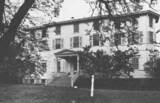
Image: Liberty Hall
William became involved in New Jersey politics, and served as a member of the Essex County Committee of Correspondence. As tensions mounted between the colonies and England, Committees of Correspondence were part of a vital communication network set up between the colonies to pass news of major events. An outspoken supporter of American Independence, he quickly rose to a position of leadership and was a delegate to the First and Second Continental Congress. His elder brother, Philip, signed the Declaration of Independence.
First Lady of New Jersey
When Susannah Livingston became First Lady of New Jersey, she was a fifty-three-year-old grandmother. When the British invaded New Jersey in November 1776, she and her adult daughters, Judith and Susannah, fled Liberty Hall for Basking Ridge, where they found refuge on the estate of her brother-in-law, William Alexander.
The ensuing war years were difficult ones for the Governor Livingston, who spent them on the run from British troops, but he didn’t shy from politically unpopular decisions. His insistence on treating those who remained loyal to the Crown with justice and moderation was resented by many Patriots. Actually his actions were quite remarkable, considering that his home was pillaged in 1776, and that a bounty was put on his head by the Loyalists.
Dangerous Encounters
That bounty, and the widespread recognition of William’s importance to the war effort, led to a number of dangerous incidents. The most dramatic occurred in February 1779 when 1000 British troops, guided by local Tories, landed in the predawn darkness near Elizabethtown to capture the governor and surprise the Continental brigade stationed nearby.
Alert sentries detected the approaching British soldiers, and William managed to escape just twenty minutes ahead of the enemy. Two of his daughters remained behind to mislead the British and hide official state papers. Confronted with a brigade of fully alerted continentals, the raiders quickly withdrew.
Throughout these trying months William’s force of character prevented widespread bitterness over the enemy’s constant harassment from diluting the state’s commitment to the cause of liberty. For the next fourteen years, his many duties, the threats of the enemy, and the disloyalty of friends caused him many hardships, but failed to overcome his spirited support of the patriot cause.
In 1779, the Livingston family was able to return to Liberty Hall, which had been looted and heavily damaged during the Revolutionary War. Between the needs of the two armies, almost everything in the house was either pillaged or destroyed, and when the family returned in 1779, daughter Susan wrote to her friends that even the “windowpanes and hinges” had been taken away.
When the war ended in 1783, William was finally able to return home. Although the pressure of affairs often prevented it, he enjoyed his estate whenever possible, and managed to pursue his great love of gardening and agriculture. He conducted agricultural experiments, and became a member of the Philadelphia Society for Promoting Agriculture, and looked forward to the day when the question of slavery would be settled through gradual emancipation.
William also served as an influential member of the 1787 U.S. Constitutional Convention, was one of the signers of the Constitution, and was instrumental in securing New Jersey’s speedy ratification. His contributions were recognized in 1788, when his alma mater, Yale University, honored him with an honorary doctor of laws degree.
William Livingston was a man of considerable wealth, and could have avoided the turmoil of the time by escaping to his land holdings. He did the opposite, and used his considerable talents to fight for independence, and later for the development of the new republic into an effectively governed nation. By heritage an aristocrat, he nevertheless fought with brilliance and selflessness for the rights of his fellow citizens.
After Susannah French Livingston died on July 17, 1789, her husband’s health began to wane. He complained of chest pains in June of the following year.
While still in office, Governor William Livingston died on July 25, 1790, at Liberty Hall in his 67th year. He was originally buried at the local Presbyterian Churchyard, but a year later his remains were moved to a vault his son owned at Trinity Churchyard in Manhattan, and in 1844 were again relocated to Brooklyn’s Green Wood Cemetery.
SOURCES
Liberty Hall
William Livingston
Wikipedia: William Livingston
Soldier Statesmen of the Constitution
William Livingston and Susannah French
